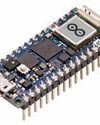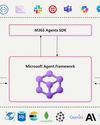Prøve GULL - Gratis
Hyperledger: An Overview
Open Source For You
|July 2024
Hyperledger stands out as a comprehensive suite of open source blockchain frameworks and tools designed to meet the diverse needs of modern enterprises. By offering robust, scalable, and modular solutions, it empowers organisations to leverage blockchain technology for enhanced security, transparency, and efficiency.
-

Hyperledger is an open source collaborative effort to help advance cross-industry blockchain technologies. Hosted by the Linux Foundation, Hyperledger provides a platform for developing decentralised applications (dApps), enterprise-grade distributed ledger frameworks, and smart contracts. It encompasses various blockchain frameworks, libraries, and tools tailored to different use cases, aiming to foster innovation, interoperability, and standardisation in blockchain development.
Hyperledger projects typically focus on permissioned or private blockchain networks, where participants are known and authenticated, making it particularly suitable for enterprise applications requiring scalability, privacy, and regulatory compliance.
Why do we need Hyperledger?
Hyperledger is needed to provide a reliable, scalable, and flexible blockchain framework tailored for enterprise use, supporting a variety of applications across industries while fostering collaboration, innovation, and compliance. There are other reasons too.
Secure transactions: Hyperledger provides a secure platform for conducting transactions without theneed for intermediaries, ensuring trust and reliability in digital transactions.
 Transparent record-keeping: Hyperledger's distributed ledger technology offers transparency and immutability, ensuring that all parties have access to the same, tamper-proof records, reducing disputes and fraud.
Transparent record-keeping: Hyperledger's distributed ledger technology offers transparency and immutability, ensuring that all parties have access to the same, tamper-proof records, reducing disputes and fraud.Cost efficiency: By eliminating intermediaries and streamlining processes, Hyperledger helps reduce transaction costs, making it more cost-effective for businesses to conduct transactions and manage their operations.
Decentralisation:
Denne historien er fra July 2024-utgaven av Open Source For You.
Abonner på Magzter GOLD for å få tilgang til tusenvis av kuraterte premiumhistorier og over 9000 magasiner og aviser.
Allerede abonnent? Logg på
FLERE HISTORIER FRA Open Source For You

Open Source For You
The Role of Open Source in Building Modern Data Infrastructure
It's no secret that open source is emerging as the backbone of modern data infrastructure. Here’s a list of the core open source technologies used to deploy this infrastructure, along with some real-world examples and a brief on why open source matters.
3 mins
December 2025

Open Source For You
The Whispering Machines: How Open Source is Bringing Intelligence to the Tiniest Devices
Built on open source frameworks, TinyML is enabling complex machine learning models to run on the microcontrollers embedded in connected devices, bringing artificial intelligence to the very edge of the network.
3 mins
December 2025

Open Source For You
Setting Up Snort to Secure Your Network
Snort is a popular, open source intrusion detection system that monitors traffic in real time to detect malware. Here’s a detailed explanation of how to set it up on Ubuntu and test it by generating traffic from another system.
7 mins
December 2025

Open Source For You
When AI Meets DevOps to Build Self-Healing Systems
Traditional DevOps, with its rule-based automation, is struggling to work effectively in today’s complex tech world. But when combined with AlOps, it can lead to IT systems that predict failures and solve issues without human intervention.
7 mins
December 2025

Open Source For You
How to Automate Java Code Modernisation
This short guide illustrates that automating Java code modernisation with Python and OpenAI API is not just possible-it's remarkably effective.
5 mins
December 2025

Open Source For You
The Quest to Build a Quantum Computer
The road to large-scale quantum computing is long and hard, with incremental advances paving the way. But the destination is in sight.
12 mins
December 2025

Open Source For You
Job Opportunities: What's Hot in the Cloud Space?
If there's one field that refuses to slow down, it's cloud computing. Even as automation and AI reshape roles, cloud adoption continues to surge. From startups deploying microservices overnight to enterprises migrating decades of legacy systems, cloud remains the engine of digital transformation. For professionals, this means one thing: skills that live in the cloud won't come down anytime soon.
2 mins
December 2025

Open Source For You
Securing Client Identity with Post-Quantum Cryptography
Here's a quick tutorial on how to build a secure, real world client-server model that establishes client identity by using CRYSTALS-Dilithium, a post-quantum cryptography algorithm.
3 mins
December 2025

Open Source For You
Unlocking the Power of Multi-Agent Solutions with the Microsoft Agentic Framework
The Microsoft Agentic Framework is rapidly emerging as a cornerstone for developers, architects, and technology leaders seeking to build dynamic, intelligent systems powered by multiple collaborating agents. In an era where automation, distributed intelligence, and adaptive software are increasingly vital, this framework offers robust tools and features to accelerate the design and deployment of agent-based solutions.
6 mins
December 2025

Open Source For You
Apache Iceberg and Trino: Powering Data Lakehouse Architecture
Apache Iceberg is a cornerstone of any open data lakehouse, providing the transactional foundation upon which highly scalable and flexible analytics can flourish. Along with Trino, it can be used to build a robust, scalable, and high-performance data lakehouse.
4 mins
December 2025
Listen
Translate
Change font size
